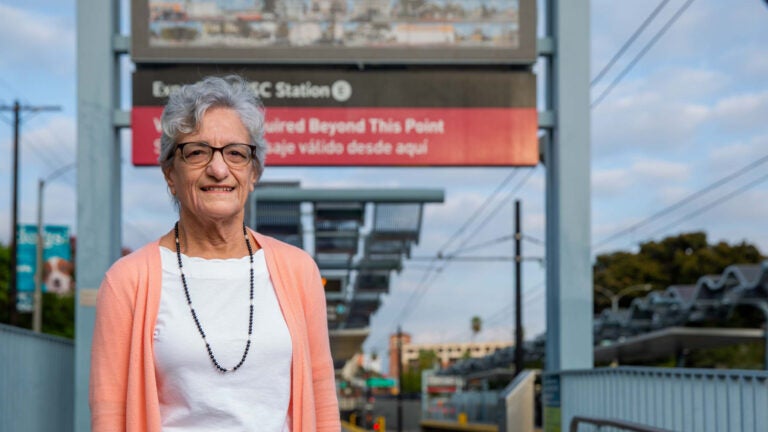
In February, Genevieve Giuliano was one of five faculty members from across the university who were named Distinguished Professors. (Photo/Walter Urie)
USC Price’s Genevieve Giuliano, new Distinguished Professor, has long been a transportation trailblazer
TITLE IX: The former METRANS Transportation Consortium director has seen progress toward gender equality since the passage of Title IX, but observes there is still room for improvement.
From her home in Huntington Beach, Professor Genevieve Giuliano loves to hop on her bicycle for leisurely rides along the coast.
Once or twice a week for work, Giuliano will drive to the USC Price School of Public Policy, where she’s the Margaret and John Ferraro Chair in Effective Local Government. But whenever possible, she’ll use public transportation to attend meetings elsewhere in Los Angeles.
 How Giuliano gets around is, on a micro scale, the focus of her distinguished 35-year career at USC.
How Giuliano gets around is, on a micro scale, the focus of her distinguished 35-year career at USC.
She’s an expert in travel behavior, transportation policy and metropolitan spatial structure, with some of her current research focused on examining the relationships between urban form, online shopping behavior and local freight demand.
You could say that Giuliano always has been on the move — both physically and scholarly.
Last year, Giuliano — who has published more than 200 papers and reports and has lectured around the world — was elected a fellow of the Regional Science Association International, which globally recognizes her as a regional scientist with outstanding research credentials.
Then, in early 2023, she was among a small group of USC faculty members to receive one of the university’s highest honors for excellence. Giuliano was one of five faculty members from across the university who were named Distinguished Professors. Another three were named University Professors. The honors are granted to a select group of academics each year.
“These faculty have brought great distinction to our university through their work, which enlightens
collective understandings and contributes to the advancement of society,” interim Provost Elizabeth
Graddy said.
“Professor Giuliano richly deserves this appointment, but, for those of us who work with her, she stands out for her mentorship, leadership and extraordinarily graciousness,” said Dana Goldman, dean of the USC Price School, C. Erwin and Ione L. Piper Chair, and the school’s other Distinguished Professor.
A longtime trailblazer
Giuliano’s research has shed new light on issues including the intersection of land use and transportation, transportation policy analysis, travel behavior, information technology applications in transportation and climate change.
An innovator in her field, she was among the first to study gender differences in travel behavior and later to partner with computer science and engineering to explore land use and freight transportation relationships.
But as a woman in a male-dominated field, she encountered her share of challenges.
“When I first applied to graduate school in 1971, I made the mistake of bringing my infant child with me to an interview with one of the department faculty,” she remembered. “The conversation quickly veered from my interests and qualifications to why I was applying to grad school when I had a baby. I was told that the department did not accept ‘dilettantes’ and was not accepted. Fortunately, such outright discrimination no longer exists.”
As the first USC Price School associate dean for research, Giuliano established crucial school infrastructure including the USC Schaeffer Center for Health Policy & Economics. She also directed and built the METRANS Transportation Consortium into a primary center for multiyear research projects.
A partnership between USC and California State University, Long Beach, METRANS’ mission is to solve transportation problems of large metropolitan regions through interdisciplinary research, education and outreach.
METRANS grew under Giuliano’s tenure from a small operation to one that conducts about $8 million worth of research every year. Last year, she stepped down as director of the METRANS Transportation Consortium after more than 20 years.
Following in the footsteps of somebody like Gen Giuliano is both an honor and, of course, a little daunting.
Marlon Boarnet, METRANS director
As Giuliano’s successor, Marlon Boarnet, said at the time: “METRANS is incredibly strong, and it’s energizing to think about how you can build from something with such a prestigious track record. Following in the footsteps of somebody like Gen Giuliano is both an honor and, of course, a little daunting.”
“Nobody was really looking at freight at the time,” she says of METRANS’ establishment in 1998. “Most transportation planning experts think about passengers and people and how people move around the urban environment, but hardly anyone thinks about all those goods that are moving around at the same time and their effects on cities.”
Giuliano participated in the first study of the impacts of global climate change on the U.S. transportation system. At the state level, she is working with the California Department of Transportation (Caltrans) and the California Air Resources Board on the implementation of the California Sustainable Freight Action Plan and subsequent legislation to reduce greenhouse gas emissions associated with California’s freight industry.
She has received multiple distinguished scholarship awards, as well as the USC Distinguished Faculty Service Award, and has served on several National Academy of Sciences committees, including the NAS Committee on Global Climate Change.
Title IX brought changes for women in academia
Reflecting on the changes she’s seen during her long career, Giuliano described the absence of women in the profession during the early days, and the gradual improvements since the passage of Title IX.
“When I gave my first paper at a national conference in 1981, I insisted that my one female friend at the conference come to my session. As I had expected, we were the only two women in the room of about 100 people,” she recalled. “Fast forward to 2003 when I had the privilege of serving as chair of the Transportation Research Board Executive Committee, the third woman and first female academic to do so since its inception in 1920.
We are making progress, but women continue to be a minority in my field.
Genevieve Giuliano, USC Price
“I am happy to report that things are changing; there have been six more women chairs since 2003,” she continued. “We are making progress, but women continue to be a minority in my field. As with most other professions, women have made great progress in universities. While still a minority among tenure track faculty, there are many more of us than there were a few decades ago and we are seeing more women in leadership positions.
And what changes still need to be made?
“It has been wonderful to see parental leave policy and more flexible tenure clocks — and to see each generation of faculty more diverse than the previous. However, we are by no means at parity,” Giuliano said. “There continues to be a gender gap in compensation, and COVID showed us how fragile our safety net continues to be for anyone with significant caretaker responsibilities.”
A version of this story was originally published on the USC Price website on Oct. 23, 2022.



